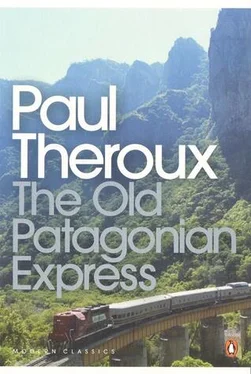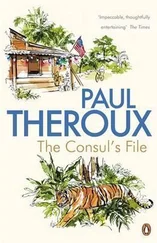Paul Theroux - The Old Patagonian Express - By Train Through the Americas
Здесь есть возможность читать онлайн «Paul Theroux - The Old Patagonian Express - By Train Through the Americas» весь текст электронной книги совершенно бесплатно (целиком полную версию без сокращений). В некоторых случаях можно слушать аудио, скачать через торрент в формате fb2 и присутствует краткое содержание. Год выпуска: 2008, Издательство: Penguin Books Ltd, Жанр: Путешествия и география, на английском языке. Описание произведения, (предисловие) а так же отзывы посетителей доступны на портале библиотеки ЛибКат.
- Название:The Old Patagonian Express: By Train Through the Americas
- Автор:
- Издательство:Penguin Books Ltd
- Жанр:
- Год:2008
- ISBN:нет данных
- Рейтинг книги:5 / 5. Голосов: 1
-
Избранное:Добавить в избранное
- Отзывы:
-
Ваша оценка:
- 100
- 1
- 2
- 3
- 4
- 5
The Old Patagonian Express: By Train Through the Americas: краткое содержание, описание и аннотация
Предлагаем к чтению аннотацию, описание, краткое содержание или предисловие (зависит от того, что написал сам автор книги «The Old Patagonian Express: By Train Through the Americas»). Если вы не нашли необходимую информацию о книге — напишите в комментариях, мы постараемся отыскать её.
The Old Patagonian Express: By Train Through the Americas — читать онлайн бесплатно полную книгу (весь текст) целиком
Ниже представлен текст книги, разбитый по страницам. Система сохранения места последней прочитанной страницы, позволяет с удобством читать онлайн бесплатно книгу «The Old Patagonian Express: By Train Through the Americas», без необходимости каждый раз заново искать на чём Вы остановились. Поставьте закладку, и сможете в любой момент перейти на страницу, на которой закончили чтение.
Интервал:
Закладка:
I dragged my suitcase to a wooden bench. I had discarded every book but Boswell, and this I started to re-read. My hands were cold. I tucked the book away and put on another sweater, and with my hands in my pockets I lay on the bench, under the sign The Train Is Your Friend. I stared at the light-bulb and gave thanks for not having been bitten by a rabid dog.
Rational or not, it was my fear. There are many satisfactions in solitary travel, but there are just as many fears. The worst is the most constant: it is the fear of death. It is impossible to spend months travelling alone and arrive in Patagonia and not feel as if one has done something very foolish. In the cold hours before dawn in such a desolate place, the whole idea seems foolhardy, an unnecessary risk, and thoroughly pointless. I had arrived alone and had nearly reached my destination, but what was the point? I had intended to enjoy myself; I had no point to prove. And yet every day I know this fear. Passing a car crash, reading of a train wreck, seeing a hearse or a graveyard; in the back of a swerving bus or noticing a firedoor that was locked (the firedoors in most hotels I stayed in were kept padlocked at night to prevent thieves from entering), or scribbling a post card and seeing the ambiguity in my sentence This is my last trip — all of it started a solemn death-knell at the back of my brain.
I had left a safe place and had journeyed to a dangerous one. The risk was death and it seemed even more imminent because, so far, no bad thing had befallen me. It seemed that to travel here, in this way, was asking for trouble. Landslides, plane crashes, food poisoning, riots, blow-outs, sharks, cholera, floods, mad dogs: they were everyday events in this neck of the woods — you needed a charmed life to avoid them. And, lying there on the bench, I did not congratulate myself on how far I had come, that I was within an ace of my destination. Rather, I understood the people who had sniggered when I had told them where I was headed. They were right to mock; in their simple way, they had seen the futility of it. Mr Thornberry, in the Costa Rican jungle, had said, 'I know what I want to see. Parrots and monkeys! Where are they?' There were guanacos in Patagonia ('Guanacos spit at you!'). Bui really, was it worth risking your life to see a guanaco? Or, to put it another way, was it worth even one night half-frozen on a wooden bench in a Patagonian railway station, to hear the trill of the celebrated Flute-bird? I did not think so then. Later, it seemed such a diverting story I forgot my fear. But I was lucky. Usually, throughout this trip, I had looked out of a train window and thought: What a terrible place to die in.
I was also worried about losing my passport, my ticket home, or being robbed of all my money; of catching hepatitis and spending two months in a hospital in a desperate place like Guayaquil or Villazón. These were informed fears. 'We risk our lives every day, just crossing the street,' friendly people say, to reassure us. But there are greater risks in the Andes and in primitive countries, and anyone who thinks otherwise is a fool.
And yet, on that bench at Jacobacci, I was glad I had left everyone else behind. Although this was a town with a main street and a railway station, and people and dogs and electric lights, it was near enough to the end of the earth to give me the impression that I was a solitary explorer in a strange land. That illusion (which is also an illusion in the South Pole and at the headwaters of the Nile) was enough of a satisfaction to make me want to go forward.
I dozed, but when I did I woke up cold. I tried to stay awake and warm. I went for three more walks, giving the dogs a wide berth. There were cockcrows, but no signs of dawn; and the only sound was the wind, pushing against the station.
I had arrived at Ingeniero Jacobacci in darkness. It was still dark when I boarded the train. The station master gave me more tea and said I could get into the coach. It was as small as I had been warned it would be, and it was filled with dust that had blown through the windows. But at least I had a seat. At five, people started to gather. Incredibly, at this hour, they were seeing friends and family off. I had noticed this custom all over Bolivia and Argentina, this send-off, lots of kisses^ hugs, and waves, and at the larger stations weeping men parting from their wives and children. I found it touching, and at odds with their ridiculously masculine self-appraisal.
There was a whistle, a steam-whistle — a shrill fluting pipe. The station bell was rung. Well-wishers scrambled from the train, passengers boarded; and, just before six, we were off.
The moon was bright in a blue sky. There was no sun, and the land around Jacobacci was blue-grey and pale brown. We were out of town before the eastern sky began to glow. I was gladdened by the hills. In the darkness of our arrival I had assumed it would be as flat as the land I had seen at twilight, that wasteland around the village of Ministero Ramos Mexia, where grape-selling boys hopped and chirped in the dust. But this was different, and there were no clouds in the sky, so I had some assurance that it would be a warm day. I ate an apple and took out Boswell, and when the sun came up I went quietly to sleep.
It was an old train, and although by this time I ought to have been inured to the strangeness of South American railways, I still found it strange. There was a boy across the aisle, watching me yawn.
'Does this train have a name?' I asked.
'I don't understand.'
'The train I took to Buenos Aires was called "The North Star", and the Bariloche express is called "The Lake's of the South". The one to Mendoza is called "The Liberator". That sort of name.'
He laughed. 'This train is too insignificant to have a name. The government is talking about getting rid of it.'
'Isn't it called "The Esquel Arrow" or something like that?'
He shook his head.
'Or "The Patagonian Express"?'
‘The Old Patagonian Express,' he said. 'But express trains are supposed to go very fast.'
They never do,' I said. 'I was on an express to Tucumán that arrived a day late. It took us six hours to leave one station, up in Humahuaca.'
'Floods,'said the boy.'Rain. It doesn't rain here, but it is still a slow train. It's these hills. See, we're going around and around.'
We were. The hills and dales of Patagonia which I had welcomed for their variation and their undeniable beauty were the cause of our slow progress. On a straight track this trip would not have taken more than three hours, but we were not due to arrive in Esquel until 8.30 — nearly a fourteen-hour ride. The hills were not so much hills as they were failed soufflés.
It was a steam train, and for the first time since leaving home I wished I had brought a camera, to take its picture. It was a kind of demented samovar on wheels, with iron patches on its boiler and leaking pipes on its underside and dribbling valves and metal elbows that shot jets of vapour sideways. It was fuelled by oil, so it did not belch black smoke, but it had bronchial trouble, respirating in chokes and gasps on grades and wheezing oddly down the slopes when it seemed out of control. It was narrow gauge, the small carnages were wooden. First was no cleaner than Second, though First had higher back-rests on the seats. The whole contraption creaked, and when it was travelling fast, which was seldom, it made such a racket of bumping couplings and rattling windows and groaning wood that I had the impression it was on the verge of bursting apart — just blowing into splinters and dropping there in one of the dry ravines.
The landscape had a prehistoric look, the sort that forms a painted backdrop for a dinosaur skeleton in a museum: simple terrible hills and gullies; thorn bushes and rocks; and everything smoothed by the wind and looking as if a great flood had denuded it, washed it of all its particular features. Still the wind worked on it, kept the trees from growing, blew the soil west, uncovered more rock and even uprooted those ugly bushes.
Читать дальшеИнтервал:
Закладка:
Похожие книги на «The Old Patagonian Express: By Train Through the Americas»
Представляем Вашему вниманию похожие книги на «The Old Patagonian Express: By Train Through the Americas» списком для выбора. Мы отобрали схожую по названию и смыслу литературу в надежде предоставить читателям больше вариантов отыскать новые, интересные, ещё непрочитанные произведения.
Обсуждение, отзывы о книге «The Old Patagonian Express: By Train Through the Americas» и просто собственные мнения читателей. Оставьте ваши комментарии, напишите, что Вы думаете о произведении, его смысле или главных героях. Укажите что конкретно понравилось, а что нет, и почему Вы так считаете.












